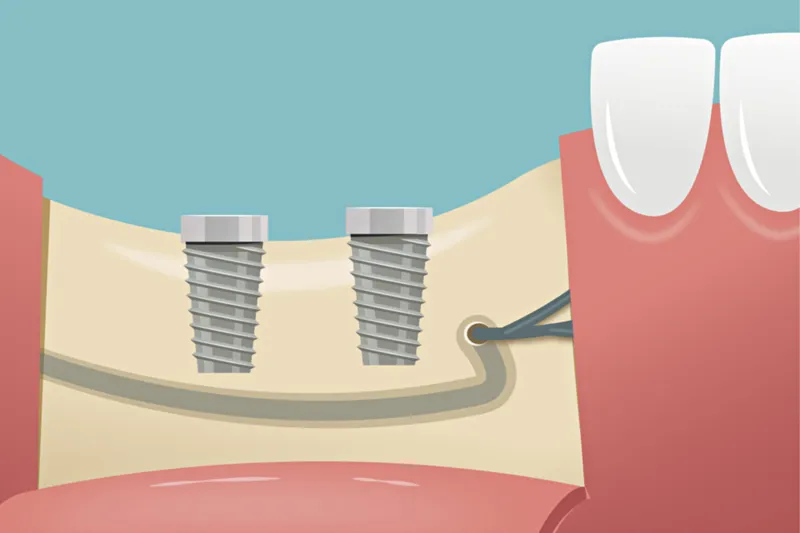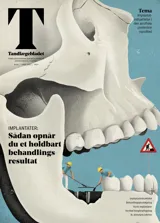Korte implantater til protetisk rehabilitering af den atrofiske posteriore mandibel
Sammenlignet med standardlængdeimplantater indsat i vertikalt opbygget knogle er anvendelsen af korte implantater en billigere og hurtigere behandling, der er ledsaget af færre intraoperative komplikationer.

Implantatretineret protetisk rehabilitering af den atrofiske posteriore mandibel nødvendiggør ofte, at der enten foretages vertikal knoglegenopbygning før implantatindsættelse eller indsættes korte implantater (≤ 7 mm). Korte implantater udgør den mindst invasive behandlingsmetode, og adskillige randomiserede kontrollerede studier samt systematiske oversigtsartikler med metaanalyser har vist høj implantatoverlevelse, begrænset marginalt knogletab og få komplikationer efter op til fem års funktionel belastning. Ud fra biomekaniske betragtninger må der eksistere en nedre grænse for længden af et implantat, der kan bære en protetisk rekonstruktion posteriort i mandiblen, og en øvre grænse for, hvor høj en protetisk rekonstruktion et kort implantat kan bære (krone-implantat-ratio). Studier med mellemlang observationstid (fem år) har imidlertid vist høj implantatoverlevelse ved implantatlængder ned til 4 mm og krone-implantat-ratio > 2.
I nærværende oversigtsartikel præsenteres den nuværende viden om anvendelse af korte implantater til protetisk rehabilitering af den atrofiske posteriore mandibel.
Klinisk relevans:
Implantatindsættelse i den posteriore del af mandiblen kan være vanskeliggjort af atrofi eller anatomiske variationer, der reducerer knoglehøjden over canalis mandibulae. Korte implantater er en minimalt invasiv metode til protetisk rehabilitering af den atrofiske posteriore mandibel, som har vist høj implantatoverlevelse, begrænset marginalt knogletab og få komplikationer efter op til fem års funktionel belastning. Korte implantater kan derfor overvejes som alternativ til større vertikale knogleopbygninger.Short dental implants for prosthetic rehabilitation of the atrophic posterior mandible
Implant-supported prosthetic rehabilitation of the atrophic posterior mandible requires either vertical bone augmentation or the use of short dental implants (≥ 7 mm). Placement of short dental implants constitutes the least invasive treatment option and several randomised controlled clinical trials and systematic reviews including meta-analyses have documented high implant survival rates, limited peri-implant crestal bone loss and few complications after up to five years of prosthetic loading. From a biomechanical point of view, a lower limit for implant lengths supporting a prosthetic reconstruction must exist as well as an upper limit for crown-to-implant ratio. However, studies with medium-range observation periods (5 years) have documented high implant survival rates of implants with a length of 4 mm and a crown-to-implant ratio of > 2.
This review will present the existing evidence on the use of short dental implants for prosthetic rehabilitation of the atrophic posterior mandible.


